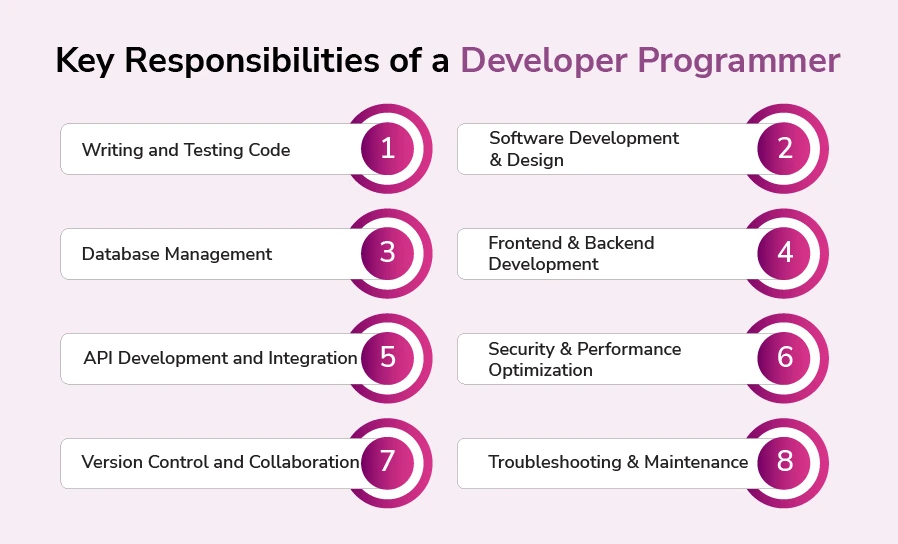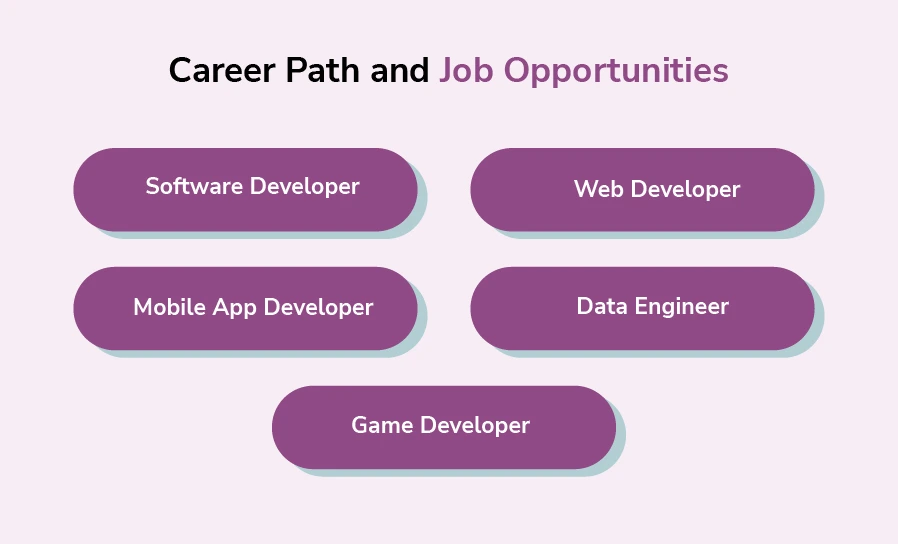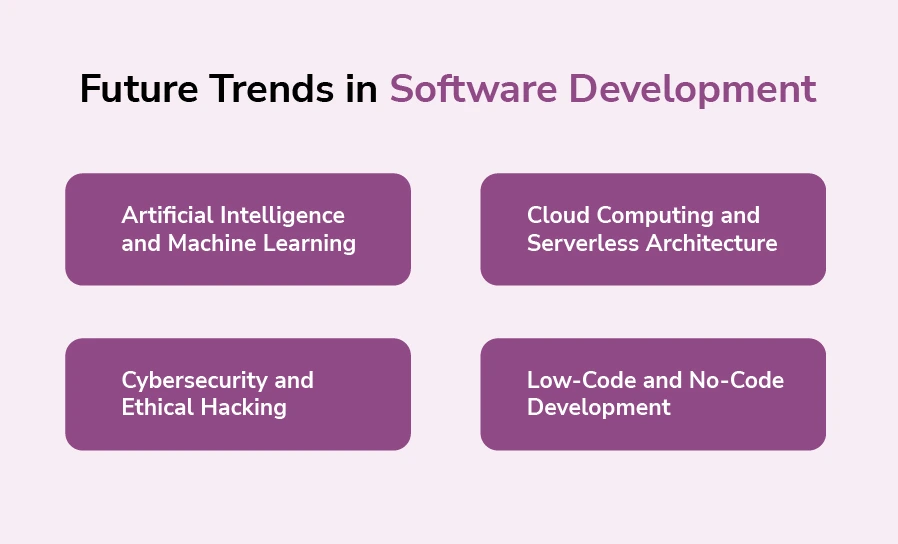
The current digital environment heavily relies on developer programmers to develop software solutions, along with their lifecycle support and performance optimisation. The technology sector relies on developer programmers to maintain functional and secure applications with superior performance levels. The paper investigates developer programmer responsibilities as well as their necessary skills and career potential alongside their industry-related work effects.
Key Highlights
- A software professional designs software code that tests enterprise solutions and mobile products, and web applications. Ensures performance, security, and scalability.
- Skill Set: Java and Python certificates complement JavaScript knowledge, which allows development from front-to-back systems as well as database access and API network connection abilities.
- Career Pathways: Includes roles like Software Developer, Web Developer, Mobile App Developer, and Data Engineer.
- Australian authorities have included this occupation on their MLTSS, L, making it eligible for skilled migration through the high-demand category.
Who is a developer programmer?
As a professional developer programmer, you must design software applications and create their code, which requires testing before maintaining active systems. These professionals work with software development for web applications, mobile systems and desktop interfaces as well as embedded systems. Developing software of excellent quality is their main responsibility to fulfil user requirements, along with satisfying business targets.
Difference Between a Developer and a Programmer
Developer stands alongside programmer as interchangeable job terms distinct in particular ways.
A program establishes a programme code through debugging processes triggered by project specifications. The programmers specialise in particular programming languages together with specific frameworks.
Software developers provide basic coding services while taking responsibility for designing software systems and solving technical challenges and team interaction to produce operational applications. The developer programmer performs both programming and developing duties, therefore acquiring a complete set of skills, which includes writing and designing software and testing and deploying applications.
Key responsibilities of the developer programmer

The specific duties assigned to developer programmers depend on their industry field, together with company size and individual job description. However, common responsibilities include
1. Writing and Testing Code
The developer creates software applications that leverage Python, Java, C++, JavaScript and PHP programming languages.
A developer programmer must guarantee their codes follow high-quality standards while also ensuring security and operational excellence.
A programmer performs unit testing followed by debugging activities to locate errors that need resolution.
2. Software Development and Design
The designer will analyse user needs to create suitable software programmes.
The developer interacts with both project managers and stakeholders and participates with team members for design work.
Maximise the performance and expand the capacity of software programs.
3. Database Management
Design, develop, and maintain databases.
Storage of data uses SQL and Nosql with additional database technologies to achieve efficient retrieval of data.
Ensure data security and integrity.
4. Frontend and Backend Development
Developers maintain active roles between client-side (front-end) components and server-side (back-end) components in software applications.
Programmers should develop intuitive interfaces using HTML together with CSS, along with JavaScript frameworks that include React and Angular.
Develop strong backend systems through the use of Node.js and Django, as well as Spring Boot or select alternative frameworks in the industry.
5. API Development and Integration
The development team will focus on building RESTful APIS as well as implementing Graphql APIs.
The software components need to have effective communication processes that enable smooth data exchange.
The application requires third-party integration, which includes a payment gateway and cloud storage solutions.
6. Security and Performance Optimisation
The team needs to discover weaknesses so they can establish security protocols.
The performance of the system will improve through optimised programming as well as database query optimisation.
Update your software routinely to fix security vulnerabilities as well as bugs that appear.
7. Version Control and Collaboration
Application developers need version control, which can be provided by Git, GitHub, GitLab or Bitbucket.
Developer programmers should work with teams through Agile and DevOps framework applications.
Maintain documentation and code repositories.
8. Troubleshooting and Maintenance
The programmer must deliver technical help to application software products.
Troubleshoot performance issues and resolve software bugs.
The software maintenance team should maintain a schedule for updating and applying essential patches to all existing applications.
Career Path and Job Opportunities

Globally, the demand for programmers and developers creates opportunities for diverse career creation in various industries. Businesses adopting digital solutions continue to enhance their presence online, and developer programmers, who are highly sought after, are in demand.
Below are the most common roles and jobs the field offers, each offering unique responsibilities and requirements.
1. Software Developer
Developer software applications for designing and building responsibly are developer software that cater to the needs of consumers and businesses. Stakeholders with whom they collaborate understand project requirements and translate them into functional code. Creating desktop applications may involve their work, software enterprise, or systems even embedded.
2. Web Developer
Web developers focus on maintaining and creating web applications and websites. Specialising they may in development front-end (experience and interface user), development back-end (logic server-side and databases), or development full-stack (skills in both front-end and back-end).
Technologies at work typically involve front-end developers like CSS, JavaScript, HTML and popular frameworks such as Angular or React. Languages often use back-end developers like Node.js, PHP, or Python and databases like MongoDB or MySQL. Developers’ full-stack skill sets both combine to build web applications that are dynamic and interactive.
3. Mobile App Developer
App developers design mobile applications specifically for devices such as mobile phones and tablets. They might develop apps for Android, iOS, or both by using technologies such as React Native, Swift, Kotlin, or Flutter.
Must they consider these challenges unique to mobile development, including optimisation performance, responsive design, and compatibility across devices, as professionals?
4. Data Engineer
Data-focused engineers work on building, maintaining, and pipelining data infrastructure for processing large volumes of data efficiently. They work with big data technologies such as Hadoop, Spark Apache, and ETL tools (Transform, Extract, Load) to collect, organise, and clean data from multiple sources.
Ensure data engineers’ availability and quality data, supporting data analysts and scientists to derive valuable insights. The programming languages they often use are Python-like, Java, or Scala, working with solutions storage data like SQL and NoSQL databases.
6. Game Developer
Developers game and design build games and video for PCs, consoles, and mobile devices. Game engines such as Unity, Unreal Engine, or Godot are used to create interactive and immersive experiences in gaming. Closely work with game developers, sound artists, designers, and engineers to integrate mechanics, audio, visuals, and gameplay.
Future Trends in Developer Programming

The field of software development is evolving constantly, with new technology and methodology shaping the industry. As businesses and consumers rely increasingly on digital solutions, software developers must follow these emerging trends to stay competitive.
Below are some key trends that are influencing the future of development software.
1. Artificial Intelligence and Learning Machine
Artificial intelligence (AI) and machine learning (ML) are becoming integral to software development. Applications that are AI-driven, such as chatbots, systems recommendations, and predictive analytics are expected to be adopted widely; see various applications across industries.
Developers will continue to incorporate AI/ML into their applications to automate tasks, enhance user experiences, and provide valuable insights from data. As models and learning machines improve, they will be more focused on making technologies accessible and scalable, enabling them to leverage them more effectively. Developers will need to rely on AI/ML techniques and frameworks to meet the demand for intelligent systems.
2. Cloud Computing and Serverless Architecture
The adoption of cloud computing has positively impacted business management pertaining to IT infrastructure. And it looks like the trend will only continue in the future. With cloud-based solutions, businesses can scale their applications, increase their performance, and lower their costs without having to maintain physical hardware, much like with serverless architecture.
Serverless architecture is an approach whereby an application developed under serverless architecture doesn’t have to worry about server management. The infrastructure is managed by the cloud providers. As a result, development will go much faster, where developers are doing more coding and less managing infrastructure.
3. Cybersecurity and Ethical Hacking
With digital solutions coming to market, there is also a growing awareness about cybersecurity. As cyberattacks become more sophisticated, it is becoming hard to stop or respond to them effectively, and thus, security in software engineering becomes more necessary.
Developers will need to secure every stage of their development lifecycle, be it secure coding, encryption, or vulnerability testing. Ethical hackers will be an important part of this process, as they will identify and fix the security holes before nasty attackers can exploit them.
4. Low-Code & No-Code Development
Low-code/no-code development platforms have become popular as more companies look for ways to create and deploy applications in a quicker and more efficient way. These programs enable people with little to no coding experience to create software through visual interfaces and drag-and-drop components.
This allows companies to speed up software development, cut development time and allow non-technical employees to be involved in the creation of digital solutions. While these development platforms will not replace traditional software development completely, they will help businesses create and rapidly prototype basic applications for customers.
5. Blockchain & Web3
Blockchain technology was first used to facilitate transactions on cryptocurrencies such as Bitcoin. However, in the early days, blockchain technologies were mostly used in applications like decentralised applications (dApps) and smart contracts. Web3, also known as the decentralised internet, uses blockchain technology to build an open, user-controllable online ecosystem.
Conclusion
A developer or programmer needs a balance of technical skills and soft skills to be successful: knowledge of programming languages, web development, database systems, cloud computing, security, and other technical skills ensures technical excellence. Problem-solving skills, communication, teamwork and adaptability are also necessary for succeeding in real-world tasks.
Continuing to develop and enhance one’s technical and soft skills enables a developer/programmer to remain ahead in the rapidly evolving technology field and develop a successful career.
FAQs
1. What does a developer programmer do?
A developer programmer is a professional who designs, writes, tests, and maintains software applications.
2. Does the developer need coding?
Yes, developers need coding skills! Coding is the fundamental skill that enables developers to build, modify, and maintain software applications.
3. What are the 4 types of programmers?
The 4 types of programmers are as follows:
- Frontend Developer
- Backend Developer
- Full-Stack Developer
- Mobile Developer
4. Who was the first programmer?
The first programmer is widely considered to be Ada Lovelace, an English mathematician and writer.
